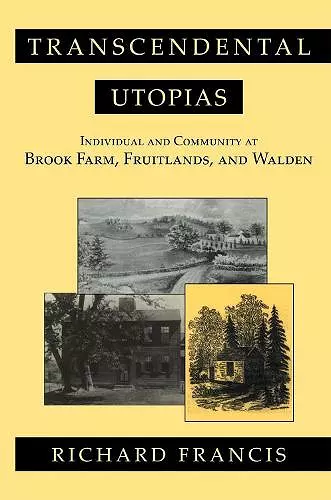Transcendental Utopias
Individual and Community at Brook Farm, Fruitlands, and Walden
Format:Paperback
Publisher:Cornell University Press
Published:4th Oct '07
Currently unavailable, and unfortunately no date known when it will be back
This paperback is available in another edition too:
- Hardback£51.00(9780801430930)

New England Transcendentalism was a vibrant and many-sided movement whose members are probably best remembered for their utopian experiments, their attempts to reconcile the contingent world of history with what they perceived as the stable and patterned world of nature. Richard Francis has written the first book to explore in detail the ideological basis of the three famous experiments during the 1840s: Brook Farm, Fruitlands, and Henry David Thoreau's "community of one" on the shores of Walden Pond.
Francis suggests that at the heart of Transcendentalism was a belief that all phenomena are connected in a repetitive sequence. The task was to explain how human society could be reordered to benefit from this seriality. Some members of the movement believed in evolutionary progress, whereas others hoped to be the agents of a sudden millennial transformation. They differed, as well, in their views as to whether the fundamental social unit was the individual, the family, the phalanstery, or the community.
The story of the three communities was, inevitably, also the story of particular individuals, and Francis highlights the lives and ideas of such leaders as George Ripley, W. H. Channing, Bronson Alcott, Charles Lane, and Theodore Parker. The consistent underlying beliefs of the New England Transcendentalists have exerted a powerful influence on American intellectual and cultural history ever since.
Francis does historians an important service by suggesting that they should move beyond such artificial dichotomies as individual versus community in their attempt to understand the complexities of transcendentalism.
* Journal of American History *The book's argument is persuasive.... Its research base in both manuscript and printed sources is impressive. Communal studies scholars will find the work of value for its important analysis and reflection.... Utopianists will find this a good theoretical work in their field.... Communal and utopian scholars will also value Francis's excellent exposition of Fourierism.... Religion... does not occupy center stage except in chapter 4, where Francis provides an intriguing exposition of religiosity and spirituality at Brook Farm, a subject too little plumbed in other works on the famous community.
* Journal of Religion *Early in his imaginative study, Francis mentions a central paradox—how to reconcile a sense of community with the exaltation of the individual as championed in Emerson's 'Self-Reliance.' Each of the three transcendental utopias was within a day's drive of Concord.... For all their fame, they were short-lived experiments and none solved the individual-versus-community puzzle.
* Publishers Weekly *Francis provides a solid analysis of performance and entertainment at Brook Farm, and in doing so makes a most convincing argument regarding the early days of the Brook Farm experience.
* H-Net Reviews *Francis provides a sprightly, well-researched, sanely argued, and lucidly written account of three variously famous and controversial Massachusetts utopian projects conducted in the Jacksonian 1840s.
-- Robert DeMott, Ohio University * American Literature *Francis's reading of Transcendentalism is penetrating, ingenious, and potentially very rewarding.... This volume represents an innovative approach to Transcendental thought.
* American Historical ReviISBN: 9780801473807
Dimensions: 229mm x 152mm x 19mm
Weight: 454g
264 pages